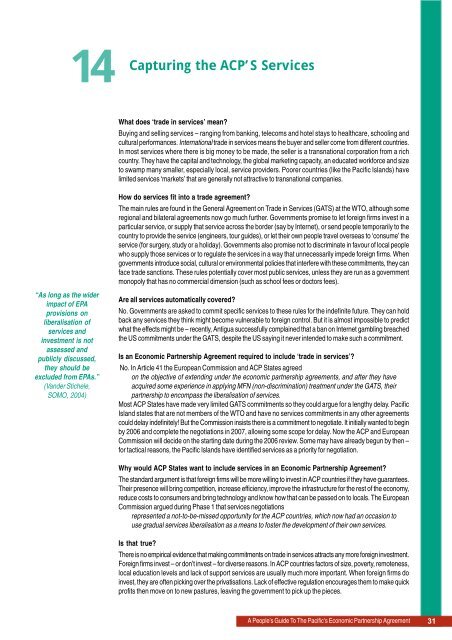REPA Booklet - Stop Epa
REPA Booklet - Stop Epa
REPA Booklet - Stop Epa
Create successful ePaper yourself
Turn your PDF publications into a flip-book with our unique Google optimized e-Paper software.
14<br />
Capturing the ACP’S Services<br />
What does ‘trade in services’ mean?<br />
Buying and selling services – ranging from banking, telecoms and hotel stays to healthcare, schooling and<br />
cultural performances. International trade in services means the buyer and seller come from different countries.<br />
In most services where there is big money to be made, the seller is a transnational corporation from a rich<br />
country. They have the capital and technology, the global marketing capacity, an educated workforce and size<br />
to swamp many smaller, especially local, service providers. Poorer countries (like the Pacific Islands) have<br />
limited services ‘markets’ that are generally not attractive to transnational companies.<br />
How do services fit into a trade agreement?<br />
The main rules are found in the General Agreement on Trade in Services (GATS) at the WTO, although some<br />
regional and bilateral agreements now go much further. Governments promise to let foreign firms invest in a<br />
particular service, or supply that service across the border (say by Internet), or send people temporarily to the<br />
country to provide the service (engineers, tour guides), or let their own people travel overseas to ‘consume’ the<br />
service (for surgery, study or a holiday). Governments also promise not to discriminate in favour of local people<br />
who supply those services or to regulate the services in a way that unnecessarily impede foreign firms. When<br />
governments introduce social, cultural or environmental policies that interfere with these commitments, they can<br />
face trade sanctions. These rules potentially cover most public services, unless they are run as a government<br />
monopoly that has no commercial dimension (such as school fees or doctors fees).<br />
“As long as the wider<br />
impact of EPA<br />
provisions on<br />
liberalisation of<br />
services and<br />
investment is not<br />
assessed and<br />
publicly discussed,<br />
they should be<br />
excluded from EPAs.”<br />
(Vander Stichele,<br />
SOMO, 2004)<br />
Are all services automatically covered?<br />
No. Governments are asked to commit specific services to these rules for the indefinite future. They can hold<br />
back any services they think might become vulnerable to foreign control. But it is almost impossible to predict<br />
what the effects might be – recently, Antigua successfully complained that a ban on Internet gambling breached<br />
the US commitments under the GATS, despite the US saying it never intended to make such a commitment.<br />
Is an Economic Partnership Agreement required to include ‘trade in services’?<br />
No. In Article 41 the European Commission and ACP States agreed<br />
on the objective of extending under the economic partnership agreements, and after they have<br />
acquired some experience in applying MFN (non-discrimination) treatment under the GATS, their<br />
partnership to encompass the liberalisation of services.<br />
Most ACP States have made very limited GATS commitments so they could argue for a lengthy delay. Pacific<br />
Island states that are not members of the WTO and have no services commitments in any other agreements<br />
could delay indefinitely! But the Commission insists there is a commitment to negotiate. It initially wanted to begin<br />
by 2006 and complete the negotiations in 2007, allowing some scope for delay. Now the ACP and European<br />
Commission will decide on the starting date during the 2006 review. Some may have already begun by then –<br />
for tactical reasons, the Pacific Islands have identified services as a priority for negotiation.<br />
Why would ACP States want to include services in an Economic Partnership Agreement?<br />
The standard argument is that foreign firms will be more willing to invest in ACP countries if they have guarantees.<br />
Their presence will bring competition, increase efficiency, improve the infrastructure for the rest of the economy,<br />
reduce costs to consumers and bring technology and know how that can be passed on to locals. The European<br />
Commission argued during Phase 1 that services negotiations<br />
represented a not-to-be-missed opportunity for the ACP countries, which now had an occasion to<br />
use gradual services liberalisation as a means to foster the development of their own services.<br />
Is that true?<br />
There is no empirical evidence that making commitments on trade in services attracts any more foreign investment.<br />
Foreign firms invest – or don’t invest – for diverse reasons. In ACP countries factors of size, poverty, remoteness,<br />
local education levels and lack of support services are usually much more important. When foreign firms do<br />
invest, they are often picking over the privatisations. Lack of effective regulation encourages them to make quick<br />
profits then move on to new pastures, leaving the government to pick up the pieces.<br />
A People’s Guide To The Pacific’s Economic Partnership Agreement 31
















